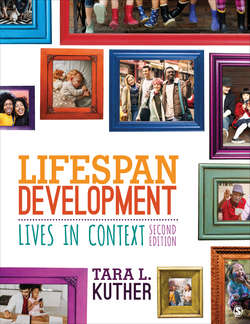Читать книгу Lifespan Development - Tara L. Kuther - Страница 305
На сайте Литреса книга снята с продажи.
Emotion Regulation
ОглавлениеAs children become aware of social standards and rules, emotion regulation—the ability to control their emotions—becomes important. How do infants regulate emotions? Very young infants have been observed to manage negative emotions by sucking vigorously on objects or turning their bodies away from distressing stimuli (Mangelsdorf, Shapiro, & Marzolf, 1995).
Smiling is also thought to serve a purpose in regulating emotions, as it allows the infant to control aspects of a situation without losing touch with it. When an infant gets excited and smiles, she looks away briefly. This may be a way of breaking herself away from the stimulus and allowing her to regroup, preventing overstimulation. Smiling is associated with a decline in heart rate, suggesting that it is a relaxation response to decrease an infant’s level of arousal.
Whereas 6-month-old infants are more likely to use gaze aversion and fussing as primary emotion regulatory strategies, 12-month-old infants are more likely to use self-soothing (e.g., thumb sucking, rocking themselves) and distraction (chewing on objects, playing with toys). By 18 months of age, toddlers actively attempt to change the distressing situation, such as by moving away from upsetting stimuli, and begin to use distraction, such as by playing with toys or talking (Crockenberg & Leerkes, 2004; Feldman, Dollberg, & Nadam, 2011).
After 18 months of age, toddlers’ vocabulary for talking about feelings develops rapidly, and their ability to tell caregivers how they feel presents new opportunities for emotion regulation (Bretherton, Fritz, Zahn-Waxler, & Ridgeway, 1986). Vocabulary predicts self-regulation abilities in 24-month-old infants (Vallotton & Ayoub, 2011). In one longitudinal study of children from 18 to 48 months, toddlers with better language skill tended to engage in more support seeking and distracted themselves more, which was linked with showing less anger at 48 months (Roben, Cole, & Armstrong, 2013). Researchers have also found that infants’ abilities to self-regulate at 15 months predict executive functioning at 4 years (Ursache, Blair, Stifter, Voegtline, & The Family Life Project Investigators, 2013).
